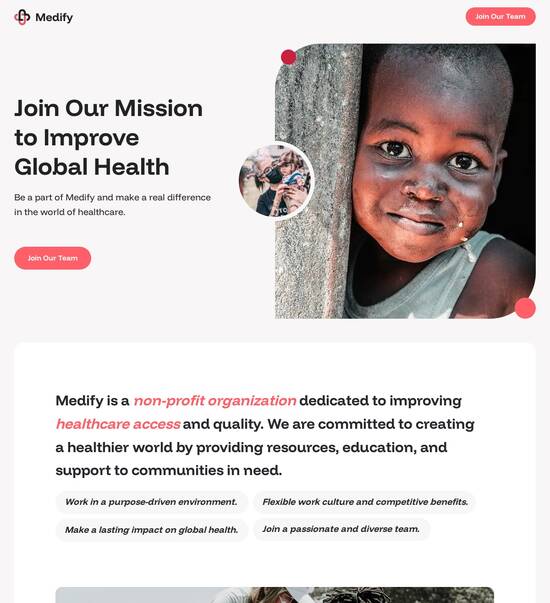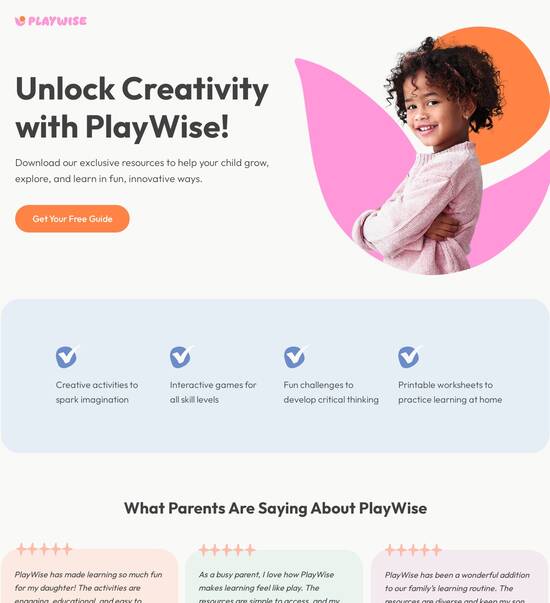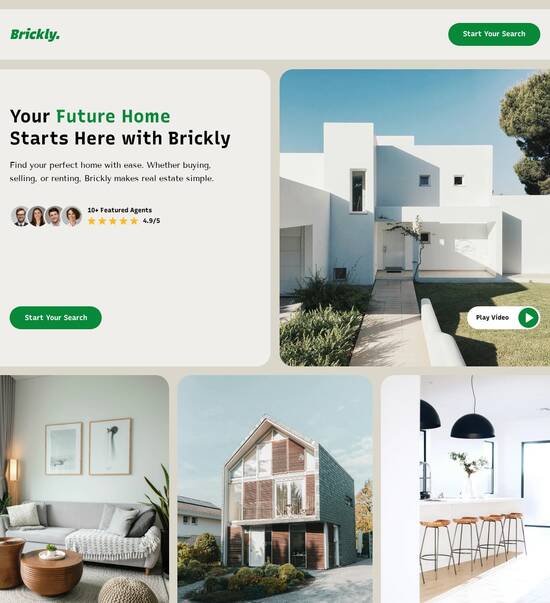
HTML page template for Schedulers
Use TemplateAbout template
Attract clients and showcase your skills with style using our landing page templates for Schedulers. Let's convert those visitors into clients!
Recommended templates

Easy to build without coding
With the intuitive drag-and-drop builder, anyone on your team can create high-converting pages without any knowledge of code or design. Make enhancements to your landing page with custom widgets using Javascript, HTML/CSS, or third-party scripts.

Multiple layouts for any industry and goal
Select from 500+ landing page layouts built to boost conversions across industry-specific scenarios. Customize them by adjusting fonts, adding images, and generating on-brand content with the AI assistant. Quickly scale with Instablocks® and Global Blocks that you can save, reuse, and update globally.

Loads fast and looks polished on any device
Every template is responsive, which means they present professionally on any device and load blazingly fast with our Thor Render Engine. You can also power them up with Google AMP technology to deliver an unparalleled mobile experience and drive higher conversions.

Robust analytics & experimentation
Get real-time updates and reporting across all your devices, showing the number of visitors, conversions, cost-per-visitor, and cost-per-lead. Launch AI-powered experiments, run A/B tests, and use heatmaps to analyze user behavior, then optimize your landing page to maximize conversions.







Easy to build without coding
With the intuitive drag-and-drop builder, anyone on your team can create high-converting pages without any knowledge of code or design. Make enhancements to your landing page with custom widgets using Javascript, HTML/CSS, or third-party scripts.
Multiple layouts for any industry and goal
Select from 500+ landing page layouts built to boost conversions across industry-specific scenarios. Customize them by adjusting fonts, adding images, and generating on-brand content with the AI assistant. Quickly scale with Instablocks® and Global Blocks that you can save, reuse, and update globally.
Loads fast and looks polished on any device
Every template is responsive, which means they present professionally on any device and load blazingly fast with our Thor Render Engine.
Robust analytics & experimentation
Get real-time updates and reporting across all your devices, showing the number of visitors, conversions, cost-per-visitor, and cost-per-lead. Launch AI-powered experiments, run A/B tests, and use heatmaps to analyze user behavior, then optimize your landing page to maximize conversions.
All the features you need to build schedule website template
Explore more featuresLearn how to build website schedule template
Frequently asked questions about schedule template html
Leading the way in building high-performing landing pages





A step-by-step guide to optimizing landing pages with Instapage
Creating effective landing pages is crucial for maximizing ROI in digital marketing campaigns. Instapage provides marketers with a robust all-in-one platform designed to streamline the creation and optimization of landing pages. This guide will explore essential steps for leveraging Instapage to accelerate campaign success and enhance conversion rates.
Step 1: Choose the right template
Choosing the right landing page template is foundational for any successful campaign. Instapage offers over 100 customizable, high-converting templates tailored to various business needs. Select a template that aligns with your brand and effectively conveys your message.
- Consider your campaign goal: Identify the specific action you want users to take, whether it's signing up for a newsletter or purchasing a product.
- Audience alignment: Choose a design that resonates with your target audience, enhancing engagement and conversion rates.
- A/B testing: Utilize Instapage's built-in A/B testing to trial different templates and refine your choices based on performance data.
Step 2: Optimize content for conversions
After selecting a template, the next step is to optimize on-page content to drive conversions. Use clear, compelling headings, and concise text to guide user engagement.
- Create a strong headline: Make it attention-grabbing and relevant to your offer to entice visitors to read further.
- Concise copy: Keep your message clear and focused, addressing visitor pain points and offering solutions.
- Call-to-action (CTA): Design an inviting and prominent CTA that encourages users to take action, such as 'Sign Up Now' or 'Get Started'.
Step 3: Utilize personalization tools
Personalization significantly impacts conversion rates, as customized experiences resonate more with audiences. Instapage allows you to implement dynamic text replacement and audience segmentation seamlessly.
- Dynamic text replacement: Tailor your messaging based on referral sources or visitor demographics for a more personalized approach.
- Ad mapping: Align your ads with specific landing pages, ensuring a cohesive message that enhances the user experience.
- Analytics tracking: Monitor audience behavior and adjust strategies based on real-time data to continually optimize performance.
Following these steps, marketers can significantly enhance landing page effectiveness, leveraging Instapage's powerful tools to capture leads and convert visitors into customers.
In conclusion, mastering the art of landing page creation and optimization using Instapage can supercharge your marketing campaigns and lead to higher ROI. Start implementing these strategies today.
Ready to elevate your landing page strategy? Sign up for a free trial with Instapage and experience the benefits firsthand!
People also ask about HTML page template for Schedulers
HTML page template for schedulers
Unveiling the HTML page templates for schedulers
Schedulers are critical components of many web applications, allowing users to plan and manage events efficiently. An HTML page template for schedulers is designed to streamline the scheduling process, making it easier for users to create, edit, and view schedules. The necessity of having an efficient template lies in enhancing user experiences and optimizing functionalities, particularly for varied users such as conference organizers, fitness instructors, and educators.
These templates can transform the way we organize tasks and events, bridging the gap between user needs and administrative demands. A well-structured HTML scheduler template not only saves time but also encourages better interaction and engagement, leading to improved outcomes for personal and group activities.
Exploring the core features of scheduler HTML templates
Scheduler HTML templates boast several core features that enhance their usability and adaptability. First, customizable layouts allow these templates to be tailored for various events and projects. Event organizers can modify colors, fonts, and overall designs to align with their brand identity, ensuring a coherent experience for users.
Mobile-responsive designs are increasingly important for modern scheduling needs. As users busy themselves on-the-go, having access to optimized layouts that function seamlessly on tablets and smartphones can significantly elevate user satisfaction.
Customizable layouts that match branding and individual preferences.
Mobile-responsive designs ensuring accessibility across devices.
Beyond aesthetics, built-in event management tools are another essential feature. Integrated calendars and timeline functionalities simplify planning tasks, while options for multi-day and recurring events facilitate the handling of intricate scheduling requirements. This makes it easy for users to visualize and manage their commitments over various time frames.
Crafting the perfect scheduler experience
To enhance user experience, incorporating interactive web components is vital. Utilizing JavaScript and CSS can make the interface not only functional but also engaging. Elements like buttons that allow for quick actions, dropdown menus for category filters, and modals for event details contribute significantly to a richer interaction.
Personalization options should not be overlooked either. Implementing user authentication features allows users to create, edit, and manage their schedules securely, giving them control over their event planning. This level of personalization empowers users and can often lead to higher engagement levels.
JavaScript and CSS for smooth and dynamic user interactions.
User authentication ensuring tailored and secure scheduling options.
Tailoring scheduler templates for different use cases
Scheduler templates need to adapt across various industries. For conference scheduling, key elements must include clear delineation of breakout sessions, keynotes, and workshops, ensuring attendees can navigate the schedule optimally. A well-organized template not only serves the event organizers but also enhances attendee experience.
For fitness and gym class schedulers, the layout should accommodate class timings, instructor names, and real-time updates regarding availability. These features are particularly critical for members looking to book classes without complications. Similarly, educational institutions can leverage scheduling templates to display class timings, instructor details, and location information, facilitating easier participation by students.
Conference scheduling templates focusing on sessions and speakers.
Fitness templates accommodating real-time class availability.
Educational templates providing clear class and instructor information.
Benefits of implementing HTML scheduler templates
Implementing HTML scheduler templates offers numerous benefits, particularly enhanced organization and clarity. Structured tables and timelines can simplify the presentation of complex schedules, thereby avoiding confusion among users. The visual organization of information significantly aids decision-making processes, allowing users to allocate their time more efficiently.
Additionally, these templates save time for administrators. By streamlining project and event management through automation, they reduce the administrative workload, freeing resources for other essential tasks. This efficiency ultimately boosts productivity across the board.
Enhanced organization with clear visual guides.
Time-saving solutions for busy administrators.
Fostering community engagement through shared scheduling.
Technical considerations for scheduler implementations
When creating HTML scheduler templates, several technical considerations must be addressed. SEO optimization techniques involve using metadata and semantic HTML to improve search engine visibility. Ensuring this visibility can drive more traffic to your scheduling application and attract a wider user base.
Another vital aspect is cross-browser compatibility. Ensuring consistent performance across devices and browsers will help maintain user satisfaction. Regular testing and updates can prevent performance issues and guarantee template functionality.
Implementing SEO strategies for better visibility.
Testing for cross-browser compatibility.
Data privacy and security measures to protect users.
Future-proofing schedulers with advanced features
To keep pace with technological advancements, integrating third-party applications can significantly boost the functionality of HTML scheduler templates. Features that connect with calendar tools, email services, or even payment gateways broaden the capabilities and enhance user experience. These integrations ensure users are kept informed and engaged, increasing overall satisfaction.
Incorporating AI and machine learning capabilities is another promising avenue. Smart scheduling systems equipped with predictive analytics can tailor experiences to individual preferences over time. This evolution could lead to a more intuitive experience, streamlining the scheduling process for users.
Integrating with third-party applications for expanded functionalities.
Utilizing AI to personalize user experiences.
Real-world success stories
Examining real-world scenarios emphasizes the value of HTML scheduler templates. For instance, a tech conference faced challenges in organizing its schedule and ensuring users could navigate effectively. By implementing a tailored scheduler template, the organizers successfully enhanced user feedback and facilitated better engagement.
Similarly, a gym that adopted a scheduling template noted a transformation in operations—high attendance rates and improved user satisfaction were significant outcomes. Users appreciated real-time tracking of class availability, further driving participation.
Educational institutions have also embraced digital timetables, leading to enhanced operational efficiency and positive testimonials from students regarding their scheduling experiences. These success stories demonstrate that the right HTML templates can lead to substantial improvements in event management.
Designing your own HTML scheduler template
Crafting your HTML scheduler template can be an exhilarating venture. A step-by-step approach should start with key considerations such as understanding your target audience’s needs and the specific functionalities required. Researching existing templates can provide inspiration and identify essential features to incorporate.
Leveraging essential tools and resources, such as HTML and CSS frameworks, can simplify the design process, allowing for a quicker setup without compromising quality. Best practices for user-friendly design include ensuring intuitive navigation and layout balance, which contribute positively to user experience, and considering accessibility features to accommodate all users.
Understanding your target audience for effective design.
Utilizing frameworks to ease the design process.
Incorporating accessibility features for improved usability.
Measuring impact and success
To effectively gauge the success of your HTML scheduler templates, analyzing user engagement metrics is paramount. By tracking how users interact with the scheduling tools, including usage patterns and feedback, you can gather essential insights that lead to continual improvement.
Additionally, assessing the return on investment (ROI) from your scheduler implementation helps contextualize its value. By focusing on key performance indicators relevant to event management success, you can determine whether the adoption of HTML scheduling templates is proving beneficial or if adjustments are necessary.
Tracking user engagement metrics for insights.
Assessing ROI to measure success and identify areas for improvement.
Conclusion of the exploration
In conclusion, HTML scheduler templates represent a transformative advancement in the way scheduling tasks are approached across various industries. Their ability to enhance organization, save time, and build community engagement cannot be understated. As technology continues to evolve, innovation in scheduling solutions remains crucial for meeting the dynamic needs of users.
By understanding the unique offerings and capabilities of these templates, businesses can better position themselves to improve operational efficiency and user satisfaction. It's clear that investing in effective HTML templates is a step towards creating a more organized and user-friendly scheduling experience.
Ready to skyrocket conversions?
Supercharge your ad campaigns with high-performing landing pages
Get started














